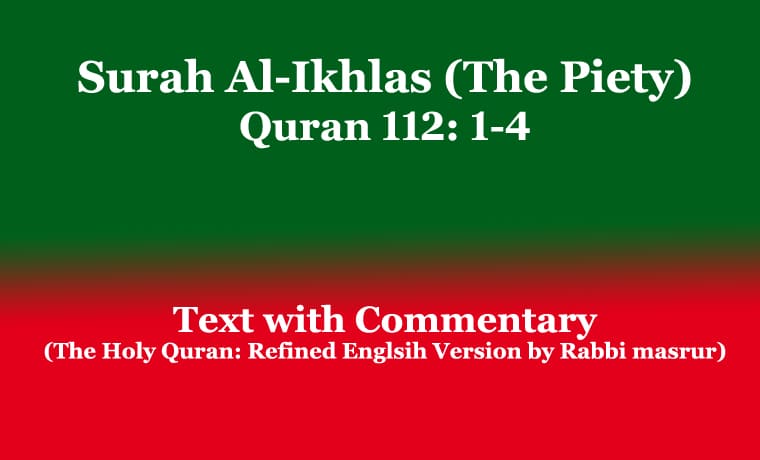Unveil the essence of Surah Al-Ikhlas (The Piety) – a timeless declaration of Allah’s oneness and majesty. Dive into its powerful text and insightful commentary.”
Surah Al-Ikhlas (The Piety): Text with Commentary
Surah Al-Ikhlas (The Piety): Text
In the name of Allah, the most Gracious, the most Merciful
He is Allah, the One and Unique
He is independent of all needs.
He begets not, nor is He begotten
There is none equal to Him.
Surah Al-Ikhlas (The Piety):Commentary
Introduction:
Surah al-Ikhlas, also known as ‘piety’, ‘Purity’ or ‘Sincerity’, is a powerful chapter in the Qur’an. It consists of four brief but profound verses, which encapsulate the core beliefs of Islamic monotheism (Tawhid).
Background of the Revelation of Surah al-Ikhlas
Surah al-Ikhlas is the 112th chapter of the Quran and has a special place in Islamic theology due to its focus on the concept of Tawhid (Oneness of Allah). The background of its revelation provides information about the circumstances and reasons for its revelation.
The revelation of Surah al-Ikhlas is associated with inquiries made by polytheists and others about the nature of Allah. These questions often arise out of curiosity, ridicule or attempts to equate Allah with their gods or worldly concepts.
The Meccan polytheists, who worshiped many idols and believed in gods with human-like attributes, often tried to challenge Prophet Muhammad (peace be upon him) about his monotheistic message. They questioned him about Allah, saying:
“O Muhammad! Describe your Lord to us. Is he made of gold or silver? Does he have any offspring?”
Again, the Jewish tribes, known for their religious depth, sometimes questioned the Prophet to test his prophethood. They asked:
“Who is Allah? What is His essence? What is He made of?”
This Surah serves as a brief but comprehensive answer, stating that Allah is beyond human understanding and cannot be compared to any created being.
The Christians of Najran, who believed in the concept of Trinity, also raised questions about the nature of Allah. Surah al-Ikhlas directly refutes such beliefs by stating that Allah is one, indivisible, and free from the attributes of being created or being born.
This Surah was revealed as a response to all those questions and inquiries, affirming the absolute unity of Allah and rejecting all anthropomorphic and materialistic notions.
Significance of the Surah
Clarification of the Attributes of Allah: This Surah was revealed to eliminate any misconceptions about the essence and attributes of Allah. It highlights His unity, self-sufficiency, and being beyond all human attributes.
Refutation of Polytheism: This Surah serves as a decisive response to the polytheistic practices prevalent in Mecca, confirming that Allah is neither like the idols worshiped by the Quraish nor dependent on creation.
Universal understanding of Tawhid: Surah al-Ikhlas simplifies the concept of monotheism, making it understandable by both believers and non-believers.
The revelation of Surah al-Ikhlas holds profound significance in Islamic theology, as-
It directly refutes the idea of associating human-like attributes with Allah, a common practice among idolaters.
The sura lays the foundation for understanding the uniqueness of Allah, which serves as a guiding principle for Muslims in their worship and belief system.
Lessons from the Revelation
Uniqueness of Allah: Sura al-Ikhlas emphasizes that Allah is not comparable to any creation, rejecting all human-like depictions or physical attributes.
Avoiding Speculation: The sura encourages avoiding speculation about the essence of Allah, reminding believers to focus on worship and submission rather than trying to understand the unknowable.
Defense of the Faith: For early Muslims, this sura served as a tool to clarify and defend their monotheistic beliefs against challenges from polytheists, Jews and Christians.
Timeless Relevance: The circumstances surrounding the revelation of Surah al-Ikhlas highlight its enduring relevance. Even today, it provides clarity in a world where misconceptions about Allah and diverse beliefs persist. It reminds Muslims to hold fast to the pure and unchanging concept of tawhid, which is the essence of Islam.
You May Like:
Surah Al-Falaq (The Dawn): Text with Commentary
Verse by Verse Explanation
Verse 1: “He is Allah, the One and Unique”
This verse declares the oneness of Allah. The word ‘ahad’ signifies absolute unity and uniqueness, which emphasizes that Allah is not only one but also incomparable. Unlike worldly entities, Allah’s unity is complete and perfect, devoid of division, multiplicity or dependency. This verse negates any form of polytheism, dualism or partnership associated with God.
Verse 2: “He is independent of all need.”
The Arabic word ‘as-samad’ is translated as ‘self-sufficient master’, indicating Allah on whom all creation depends, while He is dependent on no one. Allah is free from need and is self-existent, sustaining everything in the universe. This attribute reflects His eternal, unchangeable and absolute authority and power.
Verse 3: “He neither begets, nor was He begotten.”
This verse refutes the attribution of offspring or lineage to Allah. In some religious traditions, gods are depicted as begetting children or being begotten themselves. This verse rejects such notions, affirming that Allah is eternal and uncreated. His existence is beyond the human concept of lineage, birth or inheritance.
Verse 4: “There is no one equal to Him.”
The chapter ends by declaring that Allah is incomparable and unique. The word ‘Kufu’ means equal, comparable or similar. It emphasizes that no being, concept or creation is equal to Allah in essence, attributes or actions. It affirms His supreme majesty and absolute uniqueness.
Central Themes of Surah al-Ikhlas
Monotheism (Tawhid): The Surah encapsulates the essence of the Islamic belief in the oneness and uniqueness of Allah, rejecting all forms of polytheism and anthropomorphism.
Independence of Allah: It underlines that Allah does not need anything from His creation, while all creation is completely dependent on Him.
Rejection of Lineage: The Surah strongly rejects any notion of Allah having children, parents or any familial ties, and affirms His divine transcendence.
Incomparability: It establishes that no person or entity can be compared to Allah in any aspect.
Importance and Merits of Sura Al-Ikhlas
- Foundation of Faith: This chapter serves as the cornerstone of Islamic theology, summarizing the concept of Allah’s oneness and transcendence.
- Equivalent to One-Third of the Quran: According to authentic hadiths, reciting Sura Al-Ikhlas is considered equivalent to reciting one-third of the Quran in terms of the comprehensive essence of tawhid.
- Daily Recitation: Muslims often recite this Surah in their prayers, seeking closeness to Allah and reaffirming their belief in His Oneness.
- Protection and Blessings: Prophet Muhammad (peace be upon him) encouraged its recitation as a means of receiving blessings and divine protection.
Applications in Daily Life
Understanding Tawheed: Surah Al-Ikhlas teaches Muslims to maintain pure and undivided faith in Allah, avoiding any form of idolatry or associating partners with Him.
Trust in Allah: Recognizing Allah as independent and self-sufficient inspires a sense of humility and dependence on Him in all aspects of life.
Rejecting False Beliefs: The Surah enables believers to refute misconceptions about Allah, such as misconceptions associated with anthropomorphism or familial characteristics.
In short, Surah Al-Ikhlas is a profound declaration of Allah’s oneness, sovereignty and uniqueness. It calls on believers to acknowledge His supremacy and worship Him with sincerity and unwavering faith. 0 0 0
N.B. If you find the Surah Al-Ikhlas with Text and commentary beneficial, please share your thoughts and feelings with us.






